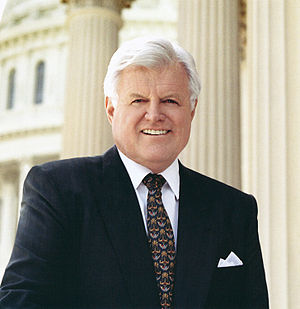 Image via Wikipedia
Image via Wikipedia
Regardless of how you feel about the man or his politics, it is always sad when somebody dies. It is particularly sad when they have to go through the ravages of cancer. At this point, the best we can do is to wish comfort for the family of Ted Kennedy. We should also wish peace upon the soul of Ted Kennedy and thank him for his service.
This morning while watching the news coverage of Kennedy's passing, they played clips of President John F. Kennedy. As I listened to JFK's quote "Ask not what your country can do for you, rather ask what you can do for your country." I had to ask myself, how did the Democratic Party go from being the party of JFK's "Ask not what your country can do for you" to the party of Ted Kennedy and what can the government provide for the people?
![Reblog this post [with Zemanta]](http://img.zemanta.com/reblog_e.png?x-id=a6e83db7-d95a-445d-ae46-791d411578a6)
great posting.with one exception,The president cared as much if not for for the"common folk" that Sen.Kennedy championed.
ReplyDeletePresident Kennedy's "ask not" sound bite is taken out of context here as he is attempting to inspire service to country, which included things like the formation of the Peace Corps. In the same speech, he also said the following:
ReplyDeleteIf a free society cannot help the many who are poor, it cannot save the few who are rich.
That is a belief shared by President Kennedy in 1961 and by Senator Ted Kennedy in 2009. And if that philosophy is wrong, I don't want to be right.
I have no problem with inspiring service to your country, the problem is what the government and the Democrats have become. Service to country is not the same as providing new entitlements to the populace. Even JFK understood that to stimulate the economy, you cut taxes and give incentives for the private sector to create jobs.
ReplyDeleteDickster,
ReplyDeleteI am not an economics expert, but it is widely known that tax cuts can be used to stimulate the economy. As you pointed out, JFK successfully utilized this. But like most tools, there is a time and a place. And if tax cuts were never balanced by tax increases you would no longer have the tool because you would reach a point where you could cut taxes no more. I had an economics professor who believed that the Republicans and Democrats balance each other, and that it would never work to have continuous tax cuts nor continuous tax increases (obviously). There is an equilibrium that must be maintained. It's a good cop bad cop routine where Republicans always shout "cut taxes" and claim good cop status.
Should Bush and Obama have cut taxes these last twelve months rather than taken the country deeper into debt with the stimulus packages? Damned if I know, but Bush's experts said that we needed stimulus, and Obama's too (in some cases, they're the same experts).
I still don't understand what you think is so different about the philosophies of the Democratic Party between JFK and TMK. What is so different about the Democrats of today when it comes to entitlements? You don't think that FDR, JFK or LBJ would be pushing for health care reform? I understand if you are anti-entitlement. I'm just not seeing the difference that you are talking about.